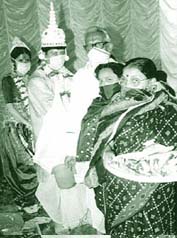Sudden death
Sudden death

a mystery disease afflicted Siliguri in West Bengal in February, 2001 and claimed 39 lives. The disease, with symptoms such as high fever, respiratory problems and paralysis, caught the city's medical and civic system unaware. As the panic spread, shops and schools were closed. "The situation got worse when doctors and nurses from some private hospitals started fleeing the town. The administration took almost one week to react to the outbreak,' says Amitaksha Nag, a resident of Hakimpara in Siliguri.
When the disease first broke in early February, local doctors diagnosed it to be encephalitis. An expert team led by the reputed School of Tropical Medicine (stm) virologist D Neogi ruled out the possibility of encephalitis. State health minister, Parthe De, quickly got into the guessing game and said it was due to cerebral malaria. Some experts of Indian Medical Association even hinted at the possibility of bubonic plague, which was further fuelled by the despatch of 150,000 tetracycline tablets.
Experts from National Institute of Communicable Disease (nicd), Delhi, National Institute of Virology, Pune, and World Health Organisation (who), who visited the areas, identified the disease in their preliminary report as a killer pathogen







